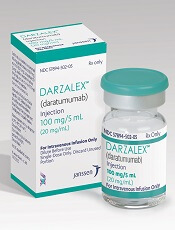
Photo courtesy of Janssen
The US Food and Drug Administration (FDA) has approved new indications for the monoclonal antibody daratumumab (Darzalex®).
The drug is now approved for use in combination with lenalidomide and dexamethasone or bortezomib and dexamethasone to treat patients with multiple myeloma (MM) who have received at least 1 prior therapy.
This approval comes 3 months after a supplemental biologics license application was submitted to the FDA.
The application was granted priority review last month, and the FDA granted daratumumab breakthrough therapy designation in July.
Daratumumab is the first CD38-directed cytolytic antibody approved anywhere in the world.
The drug received accelerated approval from the FDA in November of last year for use as monotherapy in MM patients who have received at least 3 prior lines of therapy, including a proteasome inhibitor and an immunomodulatory agent, or MM patients who are double refractory to a proteasome inhibitor and immunomodulatory agent.
Daratumumab is being developed by Janssen Biotech, Inc. under an exclusive worldwide license from Genmab. For the full prescribing information, visit www.DARZALEX.com.
Phase 3 trials
The FDA’s latest approval of daratumumab was based on data from the phase 3 POLLUX and CASTOR trials.
In the POLLUX trial, researchers compared treatment with lenalidomide and dexamethasone to treatment with daratumumab, lenalidomide, and dexamethasone in patients with relapsed or refractory MM.
Patients who received daratumumab in combination had a significantly higher response rate and longer progression-free survival than patients who received the 2-drug combination.
However, treatment with daratumumab was associated with infusion-related reactions and a higher incidence of neutropenia.
Results from this trial were published in NEJM in October.
In the CASTOR trial, researchers compared treatment with bortezomib and dexamethasone to treatment with daratumumab, bortezomib, and dexamethasone in patients with previously treated MM.
Patients who received the 3-drug combination had a higher response rate, longer progression-free survival, and a higher incidence of grade 3/4 adverse events than those who received the 2-drug combination.
Results from this trial were published in NEJM in August.


